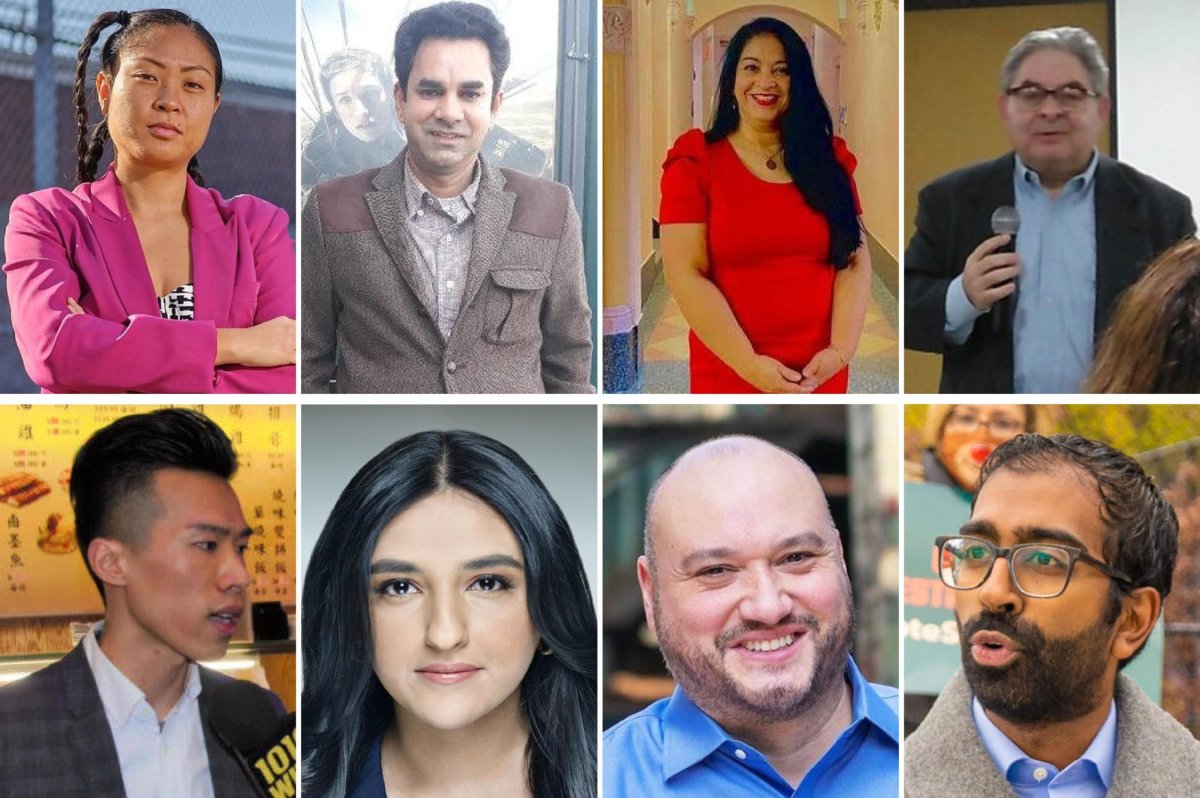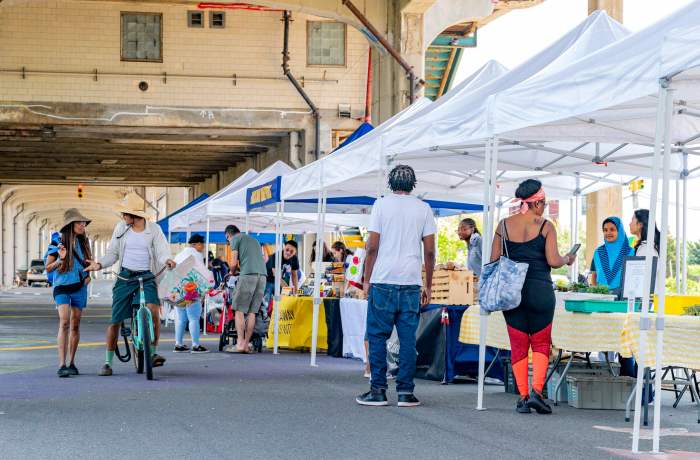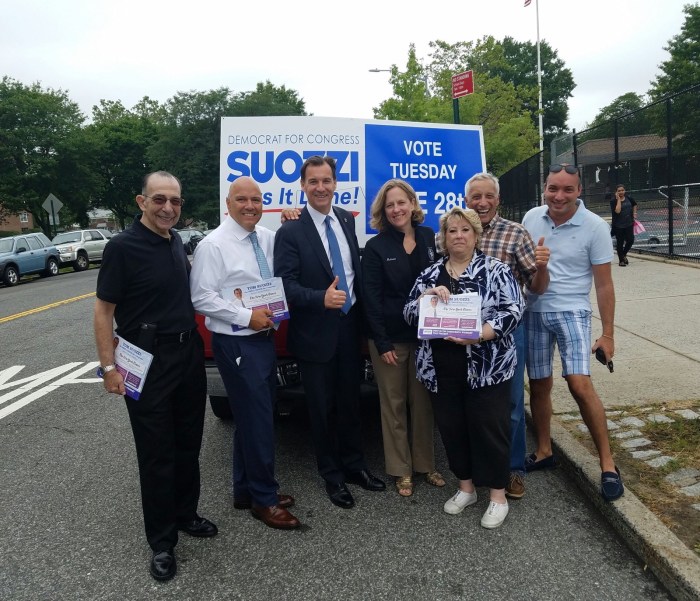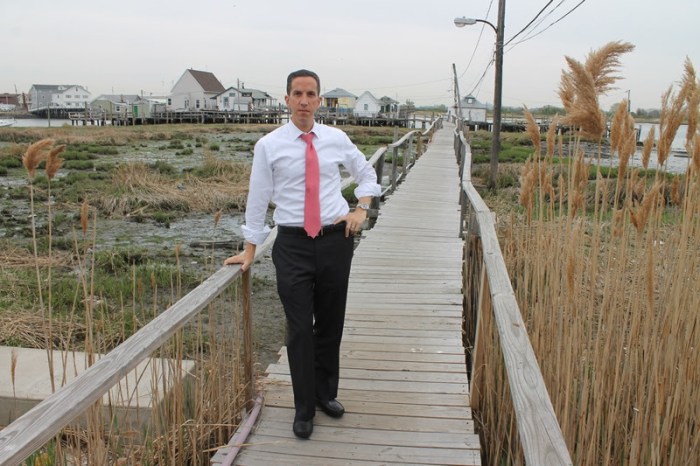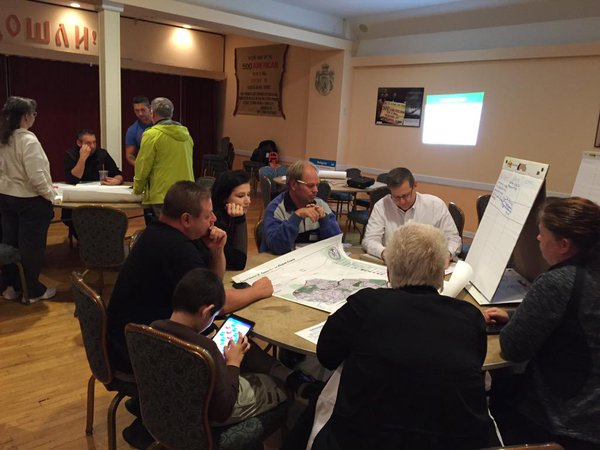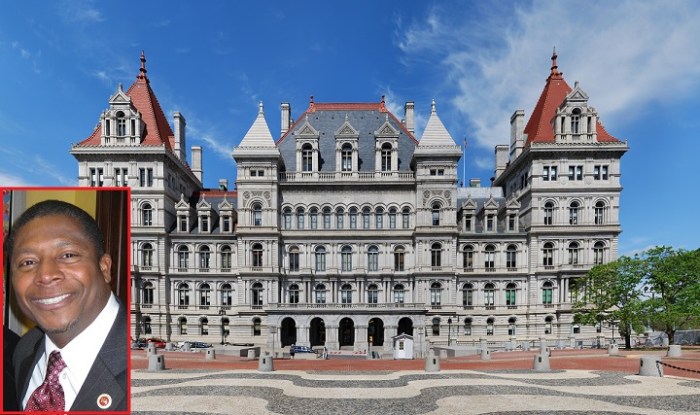There are nine candidates running to represent District 25 in the City Council this year.
The district, which encompasses Jackson Heights and Elmhurst, has been represented in the city’s legislative body by Daniel Dromm since 2009.
Like many other Council members in Queens and across the city, Dromm will be term-limited out of office this year.
The winner of November’s general election will represent a district facing several issues at the moment — including a large immigrant community impacted by the COVID-19 pandemic and a lack of affordable housing across the district — until 2023.
QNS sent five questions to each candidate running for the District 25 City Council seat, including Democrats Alfonso Quiroz, Carolyn Tran, Yi Chen, Shekar Krishnan, Liliana Melo, Fatima Baryab, Manuel Perez and Suraj Jaswal, who’s running as a Libertarian.
See their responses, listed alphabetically, below.
Fatima Baryab

QNS: What, in your opinion, are the top three most pressing issues in your district?
Baryab: The top three issues are financial empowerment, community health and nutrition, [and] immigrant economy and gentrification.
QNS: What aspect of your background speaks best to your abilities as a City Council member?
Baryab: I have been working since age 11 at our family business here. As a young American of South Asian descent, co-founder of SUKHI-NY (social uplift knowledge and hope initiatives), my team and I successfully created interfaith and transcultural dialogue which is most needed to combat extremism. We created/hosted over 500 events on Diversity Plaza since 2012.
QNS: What do you love most about your district?
Baryab: The diversity. The vibrance. And the food. This is the only district where you can tour the world with a single-ride MetroCard to Roosevelt subway station and Victor Moore bus terminal.
QNS: Which one of your opponents will you be ranking second on your ballot and why?
Baryab: The answer is contingent on who can successfully appear on the ballot post petitioning.
QNS: District 25 is one of the most diverse in the nation. How would it benefit from your leadership?
Baryab: The answer is simple: I voiced this diversity from an incredibly young age, this is exactly why I renamed 37th Road to Diversity Plaza. SUKHI was the organization that paved the way for this dream to become a reality and a “reason to celebrate America.” SUKHI’s role in reforms has been tremendous. SUKHI NY proposed and hosted the first-ever outdoor community board meeting in the history of New York City at Diversity Plaza to showcase how our democracy works. Now this effort has become a tradition in CB 3. Later, during 2014, I co-authored Legislative Resolution J3913.
Yi Chen
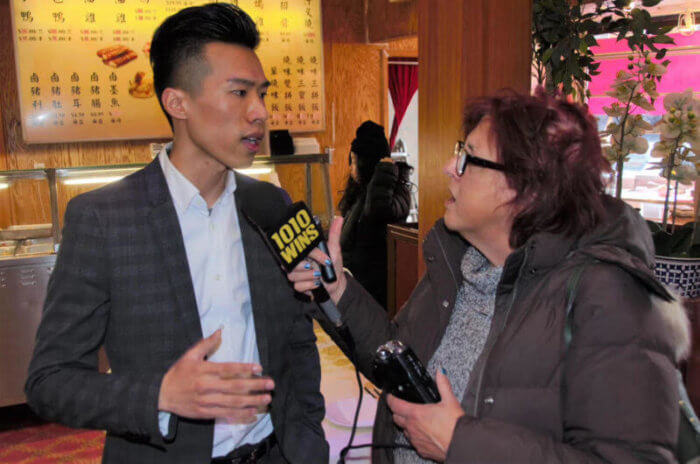
QNS: What, in your opinion, are the top three most pressing issues in your district?
Chen: A) Racial tension: When you look at all that is happening in our community, because we had a president that called the COVID-19 pandemic “the Asian virus,” people look at us as we are below them. I’ll fight to make sure that the people of the 25th District are properly educated on the coronavirus. B) Small businesses: Our area has one of the lowest allowance of services relating to the coronavirus. Our businesses are closing at an alarming rate. No one has focused on how to obtain federal monies for businesses because of cultural and language barriers. We must do better to enhance this once-thriving community. Educating our businesses in finance and technology would allow them to integrate and update many of their businesses so that they may communicate with municipal resources that will allow them to maintain a level of municipal compliance and financial assistance for their respective businesses, and also the ability to communicate amongst neighboring businesses which would strengthen these businesses. C) COVID-19: Our area has the lowest allowance of services relating to the coronavirus. There is a need for better healthcare outreach for our ever-aging community. Our children need better instruction than what’s being provided currently; they need to go back to school on a regular schedule.
QNS: What aspect of your background speaks best to your abilities as a City Council member?
Chen: Well, I guess if I had to choose, I would say my love of community and the community service I provide from my heart. I enjoy what I do for this community; it is not like so many people that I see they are paid for their community service. I ask for nothing. My payment is the look in people’s eyes that what is given to them is sincerely appreciated. So, with all the community service I’ve done over the years I have been able to connect with service providers that when I’m elected I can enhance what I do from the heart with the services of my newly gained office.
QNS: What do you love most about your district?
Chen: The diversity. We are home to one of the largest multiethnic communities in the country. Our ability to be resilient. I with a few of the community’s not-for-profit agencies have traveled throughout Queens to provide PPE and food to all those in need. Community service is what I’m known for.
QNS: Which one of your opponents will you be ranking second on your ballot and why?
Chen: This is hard. I personally have not selected anyone, but I am open to suggestions.
QNS: District 25 is one of the most diverse in the nation. How would it benefit from your leadership?
Chen: I believe that my community will benefit from my focused direction in providing personal community-based service. Most of my opponents come from either working for an elected official or they are endorsed by unions and elected officials; they are beholden to those entities. I am not beholden to anyone other than the constituents of this community. I will also commit to spending all of my funding allotment into my community, rather than only providing a small portion of funding, like most of the elected officials do in their “participatory funding” allotments.
Suraj Jaswal
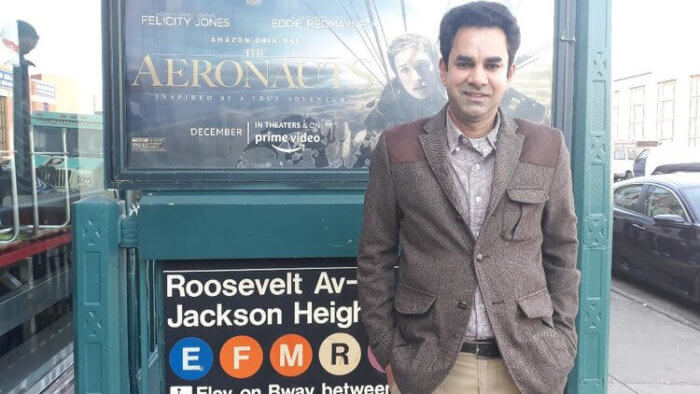
QNS: What, in your opinion, are the top three most pressing issues in your district?
Jaswal: Our district became the epicenter of COVID-19 pandemic and it revealed how inadequate our current healthcare system is. We need to urgently make improvements by opening free community clinics and we also need at least one more city hospital in the area so that all residents can have easy access to healthcare. We need affordable housing for seniors; homeowners need lower property taxes and fines so the cost of owning or renting a home can be affordable. It’s outrageous that homeowners in Park Slope (Brooklyn) are paying much lower property taxes than homeowners in District 25. We need to provide more funding to schools to reduce crowded classrooms and improve the quality of education. We also need to reduce the cost of a college education.
QNS: What aspect of your background speaks best to your abilities as a City Council member?
Jaswal: I arrived in Elmhurst from north India in the summer of 1998, and after my arrival, I studied at CUNY Baruch College and earned an MBA in finance. Having started my career waiting tables, I rose to become a top environmental consulting and testing professional dealing with issues related to asbestos, lead paint, mold, soil, air and water. As director of operations at JLC Environmental Consultants Inc., I have mastery over business finance, human resources and communicating with different stakeholders involved in our environmental projects including city agencies, building managements and homeowners. I fully understand how city government works and how current city laws affect homeowners and community alike. I’ve also volunteered in a soup kitchen and serving as a board member of a community mental health organization in the Bronx. I love to read and reading various city laws is part of my current job description. I’m a father of two boys and understand joys and challenges faced by families especially like mine where only one parent is the breadwinner. I believe my education, professional environmental licenses and experience in dealing with various city agencies will be an asset to the City Council. I’m 46 years old and I want to dedicate the second part of my life giving back to the community and make living in this city a pleasant and secure experience.
QNS: What do you love most about your district?
Jaswal: Having the option to take different trains at Jackson Heights/74th Street Subway station (E, F, N, R, 7); various food options and having libraries at a walking distance.
QNS: Which one of your opponents will you be ranking second on your ballot and why?
Jaswal: I haven’t made up my mind about it but I will favor the candidate who plays fair and display his or her real persona. Any candidate challenging signatures on petitions of other candidates won’t be my choice as every candidate has a right to ballot access.
QNS: District 25 is one of the most diverse in the nation. How would it benefit from your leadership?
Jaswal: As an independent candidate and a person who grew up in the foothills of Himalayas, I hope to bring a fresh perspective to solve the problems faced by our community and make life easier for residents. With many residents facing food shortages, I want to open City Canteens that offer cooked meals at reasonable costs and would like to run it at a no profit, no loss basis to create a win-win situation for the city as well as residents. I would propose legislation that makes personal finance classes mandatory in high school so that students can make better choices regarding college and life. Financial literacy is important and I will offer to conduct such classes myself to start this program. [The] city also needs to help low- and middle-income families with low-cost books for college. I would also like to push the city to open more free community clinics and build a hospital in western Queens.
Shekar Krishnan
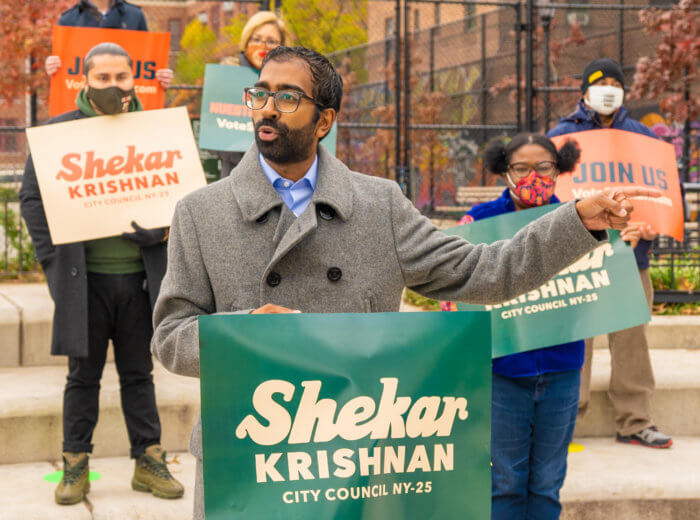
QNS: What, in your opinion, are the top three most pressing issues in your district?
Krishnan: 1) Housing is a human right, and it must be treated that way. Rampant private development and rezonings around us have made our neighborhoods unaffordable for most. Where your home is affects everything else around you — access to health care, employment and integrated schools. 2) We are a community of immigrants, and our immigrant neighbors were the essential workers of our city. Yet during this pandemic, so many of them were excluded from government relief at every level. We must provide emergency COVID relief to workers and small businesses, and create an unemployment insurance fund for the undocumented. 3) Our neighborhood public schools are terrific institutions, and I’m a proud public school parent myself. Yet, our public education system is deeply segregated. Our local schools are owed so much in badly needed government funding, and they are overcrowded. During this pandemic, the voices of our district’s students, teachers and families were not prioritized and heard in City’s Hall decisions about closing/reopening schools or remote learning. The city must take swift action to support our schools, centering our educators and families, and focusing in particular on multilingual students, homeless students and students with disabilities.
QNS: What aspect of your background speaks best to your abilities as a City Council member?
Krishnan: I’m running because I understand how important it is for everyone to have a home — not just a place of shelter, but a place of belonging and inclusion that Elmhurst and Jackson Heights have been for so many communities like my own. I’ve dedicated my career as a civil rights lawyer to fighting for low-income tenants against housing discrimination and community displacement. For the last decade, together with so many of my neighbors, we have organized for immigrant and housing rights, for racial justice and dismantling the school-to-prison pipeline, to root out hate and intolerance against our LGBTQIA+ community, for safe streets for our children and seniors, and to protect and grow our public open spaces like Diversity Plaza and Travers Park. I’ve taken this fight from the streets to the courtroom. Now, together, we will take this fight to City Hall.
QNS: What do you love most about your district?
Krishnan: In addition to being one of the most vibrant and diverse communities on the planet, our communities have always been essential to this city. It was our workers — our street vendors, taxi workers, grocery store workers and frontline health care workers — that sustained this city during the pandemic even while we were at the epicenter of it. That is a testament to our extraordinary strength and resilience as Elmhurst and Jackson Heights. It’s what I love most about our district. It’s how I know that together we can rebuild our city so that it protects our most vulnerable and so that everyone can thrive.
QNS: Which one of your opponents will you be ranking second on your ballot and why?
Krishnan: I am thinking about this very seriously. I support ranked-choice voting, and I’m still doing my due diligence. I do know that my number two choice will be the next most progressive candidate in this race with a proven record of leadership in community activism.
QNS: District 25 is one of the most diverse in the nation. How would it benefit from your leadership?
Krishnan: Representation matters in politics and government. We need to ensure that the voices of communities so often invisibilized are heard. I’m the son of immigrants from India in a city that has never elected a South Asian person to the City Council. My wife is an immigration public defender, and we (and our two small children) are an interfaith and interracial family. Through my work in the housing movement for more than a decade and fighting alongside my neighbors in community struggles, I learned to speak fluent Spanish. I’ve organized for years together with those ignored by powerful institutions and demanded dignified and just treatment for communities of color — both in the streets and in the courtroom. It’s this grassroots perspective, grounded in years of advocacy and racial justice work, that I would bring to the City Council so that, together, we can ensure a better future for our neighborhoods and city.
Liliana Melo

QNS: What, in your opinion, are the three most pressing issues in your district?
Melo: Our 25th District is part of the neighborhoods that were labeled as the “epicenter of the epicenter” of the pandemic. At this point, it is so important to work on strong legislation that would help to create new jobs, support small businesses and stimulate growth in our economy. All families deserve the opportunity to get ahead. That is why I’ll work to create policies that will improve our educational system and keep our schools safe. I’ll also work to increase access to affordable housing for all families. I’ll work to increase protection for all homeowners, and support of projects that will help to revitalize our public transportation system. I’m very committed to my district and NYC to work for a strong and more resilient New York. And I believe we can do it.
QNS: What aspect of your background speaks best to your abilities as a City Council member?
Melo: I do not talk so much, but act and solve more. My experience as an officer in the Navy in Colombia and project manager will be determined to create real legislation that supports and improves the economy of the city and provides security to our families. I am a determined and organized person. I don’t give up through adversities, and I see everything as an opportunity for growth and doing better.
QNS: What do you love about your district?
Melo: I love the diversity in my district. This diversity provides space to propose better solutions and the creation of real action plans.
QNS: Which one of your opponents will you be ranking second on your ballot and why?
Melo: It’s a little early to think about that since we are just in the petitioning process, and others, as me, are still working on raising money to get help from the matching funds program.
QNS: District 25 is one of the most diverse in the nation. How would it benefit from your leadership?
Melo: I want to be the next City Council member for District 25 because I’m committed to the recovery of NYC, the city that has been so good to my family and me. My unique set of experiences as an immigrant, along with my experiences as a small business owner will help with NY’s road back to normalcy.
Manuel Perez
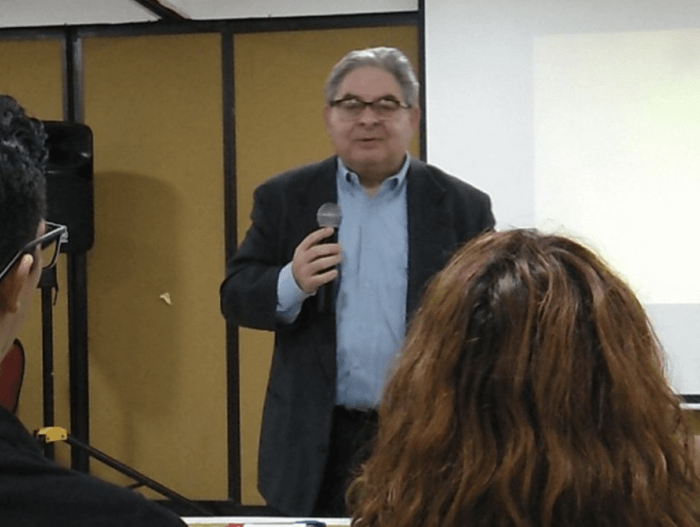
QNS: What, in your opinion, are the top three most pressing issues in your district?
Perez: Children and youth education; safe, accessible and reliable public transportation; and affordable housing.
QNS: What aspect of your background speaks best to your abilities as a City Council member?
Perez: Over two decades experience in bilingual training community leaders and neighbors on their interests and needs. This includes overseas training of municipal officials on governance.
QNS: What do you love most about your district?
Perez: Our diversity and opportunities for entrepreneurs.
QNS: Which one of your opponents will you be ranking second on your ballot and why?
Perez: Carolyn Tran, thanks to her experience in the district.
QNS: District 25 is one of the most diverse in the nation. How would it benefit from your leadership?
Perez: With my experience working with different communities and cultures, I will ensure that every neighbor’s voice is heard and used to fuel city government’s decisions, and my work experience in corporate, nonprofit and small business settings will ensure that our local economy will support the district’s well-being.
Alfonso Quiroz
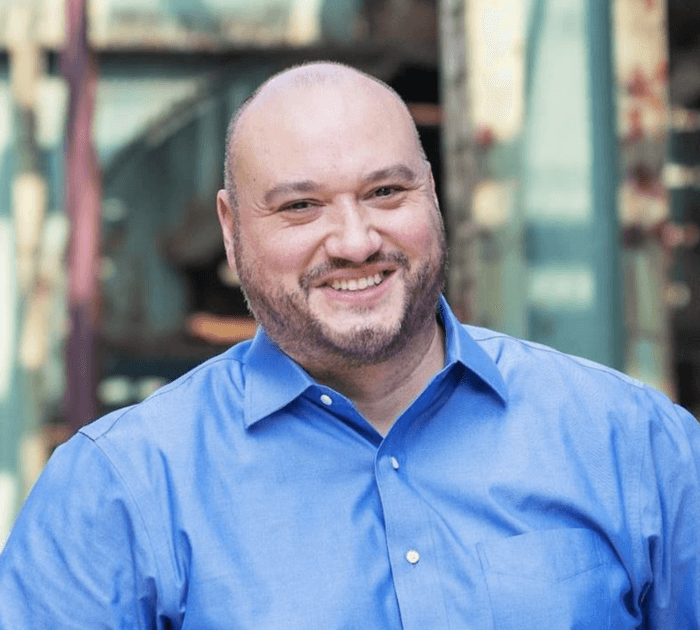
QNS: What, in your opinion, are the top three most pressing issues in your district?
Quiroz: The foremost issue in our district is addressing the disparities in healthcare infrastructure. In almost every metric from health outcomes for immigrants, to per-capita spending, to lack of hospital beds — District 25 has been forgotten. We need more investment in Elmhurst Hospital and our healthcare safety net as a whole. Second, District 25 prides itself on its huge presence of small businesses, particularly MWBEs and immigrant-owned businesses — but not enough has been done to address the real needs facing this group, including commercial rental assistance, expanding SBS loans and ensuring they have the resources to weather the coming months.
Third, lack of truly affordable housing is acutely felt in Jackson Heights and Elmhurst as property values and rents continue to rise while working families have seen drastic income cuts. The incoming Council must make it a priority to increase our stock of truly affordable units, while expanding protections and subsidy programs to existing tenants to stem the tide of homelessness.
QNS: What aspect of your background speaks best to your abilities as a City Council member?
Quiroz: I have been a lifelong organizer who understands that strength comes from grassroots movements. Whether it was through successful advocacy for 37th Avenue sidewalk cafes, or by creating a network for LGBTQ community members, I always seek to amplify a diversity of voices to achieve results together. I will build on these values in the City Council.
QNS: What do you love most about your district?
Quiroz: I love the vibrant, thriving and exciting atmosphere along Roosevelt Avenue.
QNS: Which one of your opponents will you be ranking second on your ballot and why?
Quiroz: I am honored to run with so many great candidates from such diverse backgrounds. I look forward to having productive debates and conversations with all the candidates in the next few months as we approach the primary. But I haven’t decided how I will rank my ballot just yet.
QNS: District 25 is one of the most diverse in the nation. How would it benefit from your leadership?
Quiroz: I’m extremely proud of the diversity found in District 25. As a Latino New Yorker, I’m acutely aware of the struggles facing our Black and brown communities, especially our immigrant families and will work to bring these issues to the forefront of my advocacy in the Council. Furthermore, as the only openly gay candidate in this race, I want to stress the importance of electing LGBTQ voices to the City Council, especially as we combat the harmful rhetoric that reared its head over the past four years.
Carolyn Tran
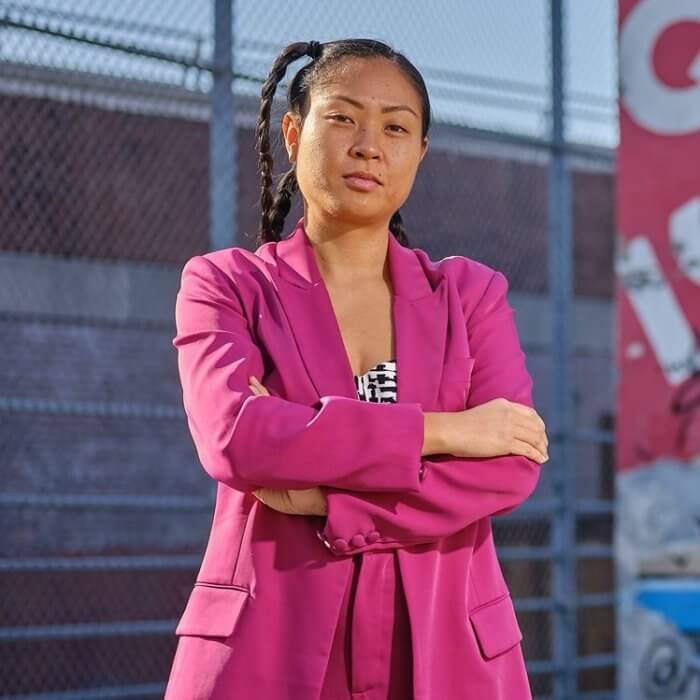
QNS: What, in your opinion, are the top three most pressing issues in your district?
Tran: Healthcare justice: Too many of our community members are having to choose between food, shelter and their health. Our campaign will support and prioritize a universal healthcare system that is accessible to all regardless of immigration or economic status
Housing justice: Many of our community members live in fear of being pushed out of their homes, live in overcrowded conditions and need help navigating rental assistance programs and housing courts. Our campaign will support legislation that will provide funding to community groups that provide housing counseling, tenant services and legal representation. We will champion legalizing basement apartments and support the creation of Community Land Trusts in our district.
Economic justice: Our district is home to a significant number of essential workers and small immigrant-run businesses. Even before the pandemic, our local businesses struggled to stay afloat and our workers often struggled under abusive, exploitative conditions without any labor protections. Our campaign will prioritize stronger protections for street vendors and small businesses including pandemic relief funds and commercial rent stabilization. We will also protect the collective bargaining efforts of all workers.
QNS: What aspect of your background speaks best to your abilities as a City Council member?
Tran: In 2010, I started an internship in Council member Daniel Dromm’s district office and I worked my way up to become chief of staff. I started my career in public service in constituent services by helping my community navigate bureaucracy and resources. That experience defined my understanding of city government and its role in being a safety net and advocate for everyday people. My role has always been behind the scenes in service and labor in support of the leadership of others; however, after a decade of service in the shadows of others, I was inspired by the many progressive women of color, BIPOC and LGBTQI+ activists stepping up to pursue public office and transform NYC politics.
QNS: What do you love most about your district?
Tran: I love the resilience of our district. As we continue to battle this pandemic, our workers, street vendors and small business owners continue to live in dignity and in service to our community despite the immense challenges. District 25 gave me my first job in government, but it also gave me a home and a family. It is where I was able to sharpen my analysis on class, race, gender and justice through meeting neighbors and hearing their stories.
QNS: Which one of your opponents will you be ranking second on your ballot and why?
Tran: We are reviewing and consulting with all of our community stakeholders before deciding on a second rank. We are working on educating our working-class community voters about RCV, which for many members will be their first time ever voting. We believe in supporting the leadership of progressive women of color.
QNS: District 25 is one of the most diverse in the nation. How would it benefit from your leadership?
Tran: I’m a 38-year-old single mom of two young daughters. I’m running because I believe that it is time for a Vietnamese-American feminist with demonstrated expertise in public service to represent District 25 in the City Council. My vision for this district is to center our working-class communities, politically educate and bring our newer immigrant communities who are often marginalized because they do not have a voice in electoral politics. This campaign is an opportunity to engage and conduct mass political education on social justice issues. We strongly believe in an inclusive, transparent, community-led decision-making process and horizontal leadership. Language justice is a cornerstone policy of our campaign. When elected, we will prioritize and invest in a holistic approach when addressing the educational and emotional needs of our multilingual communities. Our main tenant in this campaign is co-governance. It’s not enough to only bring working-class communities into the political fray but to take political leadership from them. Our campaign is committed to ensuring that my leadership would be one that takes guidance from grassroots organizers and organizations. Progressives can’t be just judged by what we say. We have to put those values into action and demonstrate by what we do, and how we do it.

